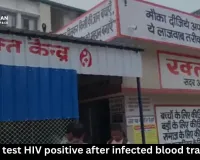Bengaluru Metro turns lifesaver: Heart and lungs reach hospitals in record time, saving patients’ live
Digital Desk

In a remarkable display of coordination and speed, Bengaluru Metro Rail Corporation Limited (BMRCL) and a medical team from Sparsh Hospital pulled off a life-saving operation on Thursday—transporting a human heart and lungs across the city for emergency transplants in record time.
According to BMRCL, the heart was brought to Goraguntepalya Metro Station at 9:34 AM and delivered to Banashankari Station by 10:15 AM, covering 17 stations in just 41 minutes. Meanwhile, the lungs were transported from Goraguntepalya to Bommasandra Station, starting at 10:05 AM and reaching the destination at 11:13 AM, after an interchange at RV Road Station—a journey spanning 31 stations in only 68 minutes.
The quick and congestion-free Metro transport ensured that both organs arrived in time for successful transplants. Notably, a human heart must be transplanted within six hours of retrieval to remain viable.
Images from the operation showed hospital staff and BMRCL employees working seamlessly together—transferring the organs from ambulances to Metro trains and ensuring safe passage through stations.
Metro’s continuing support for medical emergencies
BMRCL confirmed that it will continue assisting in future organ transport missions, highlighting the success of this joint effort. Metro security officers, station personnel, and doctors coordinated closely to deliver the organs to Aster RV Hospital and Narayana Health City with precision and without disruption.
Narayana Health City praised Bengaluru Metro for enabling swift, traffic-free movement across the city, calling it instrumental in saving lives through timely organ transplants.
Understanding organ donation
Organ donation involves transplanting healthy organs from a donor into patients whose organs have failed. In India, hundreds of thousands await organs like kidneys, livers, and hearts each year, but many die due to a shortage of donors. A single brain-dead donor can potentially save up to eight lives.
The Human Organ and Tissue Transplantation Act, 1994 governs the process in India, ensuring ethical and legal compliance. The government also conducts awareness campaigns to encourage donation and dispel myths surrounding it.
Organs vs. tissues
-
Organs such as the heart, lungs, liver, and kidneys are vital for life and often require urgent transplantation when they fail.
-
Tissues, including eyes, skin, bones, and heart valves, though smaller, are equally valuable for restoring bodily functions and quality of life.
A noble partnership for saving lives
This latest operation reinforces how public infrastructure and medical innovation can come together to create real impact. Bengaluru Metro’s swift response once again proved that beyond being a mode of transport, it is also a lifeline in critical medical emergencies

.jpg)


.jpg)
.jpg)
.jpg)
.jpg)
.jpg)
.jpg)
.jpg)
